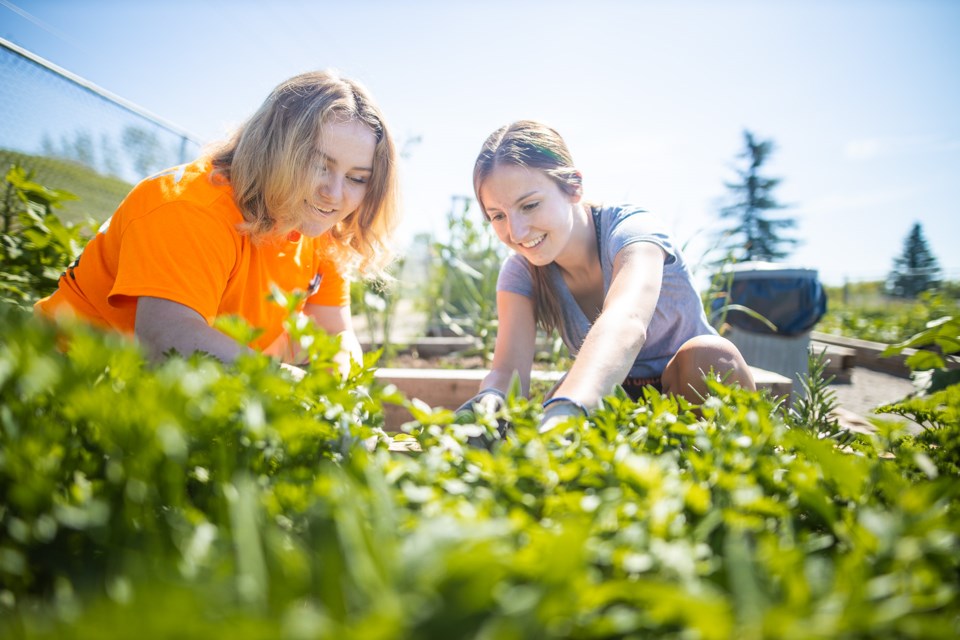The Okotoks Food Bank Community Learning Garden is officially hitting its stride as another year’s crop blooms.
Located on a 20-metre by 10-metre plot in the Okotoks Community Garden in Kinsmen Park, the community learning garden was started in 2016 after the food bank received a $5,000 grant from Food Banks Canada.
“The first two years weren’t great,” said Pamela McLean, executive director of Okotoks Food Bank. “We had some soil contamination issues to deal with, but it’s back on track now. I would say last year was the first year where we had a true, unhindered crop.”
The food bank harvested over 1,000 pounds of fresh fruits and vegetables in 2018, and hopes for a similar return this year.
After the original crop in 2016 was rendered unusable by soil contamination likely by pesticide or herbicide run-off, the Town and garden expert Lori Neufeld have worked to balance the soil through charcoal activation.
“It took a while for this charcoal activation to take hold, so in 2017 it was kind of hit and miss,” said McLean. “Then last year, absolutely, it was clean soil. There was no pesticides, herbicides, or insecticides.”
After a slow winter thaw and a rainy June, the garden has had a bit of a slow start this year, she said, but is starting to bloom in full force now.
“Our bok choy is blooming, we had to harvest the spinach before it went to seed, the sunflowers look very happy,” she said. “Things are a bit slower this year, but even despite those conditions, something is working.”
The push for healthier food options has been seen in food banks across the country.
Last month, McLean attended the Food Banks Canada national conference held in Halifax. She said an observation by a keynote speaker, Dr. Sylvain Charlebois, resonated with her and her own experiences: that food banks in Canada are no longer a place to deliver calories, but rather their mission is to deliver wellness and healthy food.
She found that most of the food banks at the conference had a community garden as well, demonstrating the shift from delivering any kind of calorie to having a focus on health and wellness.
The Okotoks Food Bank strives to have 45 per cent of fresh produce and frozen protein in its weekly food hampers, and the garden helps to reach that internal goal for fresh foods, according to McLean.
The food bank is also piloting a new project to supplement the food hamper this summer, she said, after noticing 15 per cent of its users consist of smaller households of one to two people. The standard hampers, which contain seven to 10 days of food, could be overwhelming to those households.
“They don’t always require that (much food) but would like some fresh produce to have on hand, so in June we launched a new program called the Fresh Fruit and Veggie Pack, and it’s available to the clients within our area,” she said.
Unlike the food hampers where clients can receive six hampers in a 12 month period, clients registered for the Fresh Fruit and Veggie Pack can receive one per month, consisting of a shopping bag full of fresh produce.
Each pack will have staple produce—such as potatoes, carrots and onions—as well as green leafy vegetables, fresh herbs, and seasonal produce as it is available.
“This is where our own community garden is coming into play,” said McLean. “We’re actually able to use our own produce versus buying it.”
She said that her budget doesn’t always allow her to purchase organic produce in the store, which is often more expensive. The community learning garden helps make that choice easy.
“It’s more cost-effective for sure, and we’re guaranteed that it’s free of pesticides and insecticides,” she said. “We know that what we’re producing is organic.”
For more information on Okotoks Food Bank services or how to volunteer, go to okotoksfoodbank.ca.




